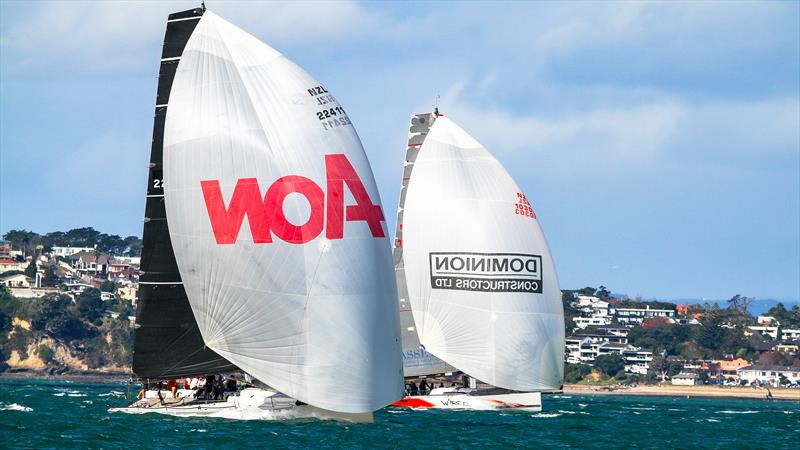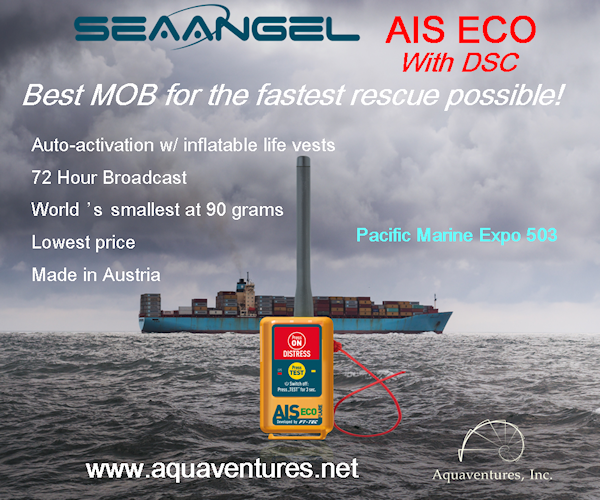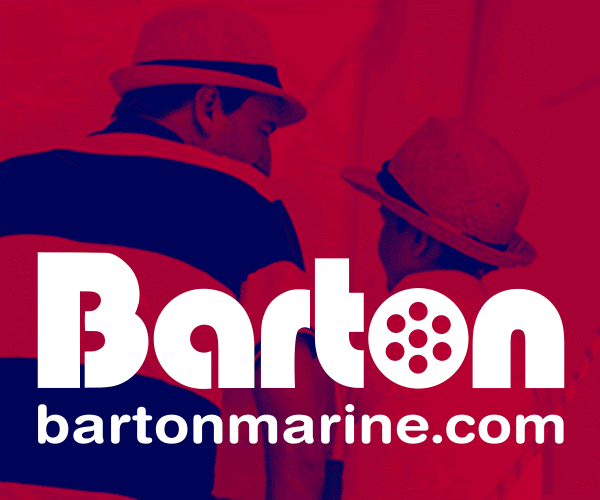
Letter from the Antipodes: Auckland’s loss is Barcelona’s gain..SailGP shake-out..Key ETNZ projects
by Richard Gladwell/Sail-World.com/nz 2 Jun 18:10 PDT
22 March 2022

50fters go head to head – Doyle Sails Winter Series – Royal New Zealand Yacht Squadron, May , 2022 © Richard Gladwell, Sail-World.com / nz
Piece by piece, more information is coming out about the 2024 America’s Cup hosting in Barcelona.
Reasons other than financial, are emerging as to why the regatta was not staged in Auckland.
A commentary piece on the website of Emirates Team NZ’s agent, London based Origin Sport, indicates the bid process started in May 2020 – ten months before the 36th America’s Cup Match was sailed. The prospect of hosting an America’s Cup attracted early, and significant, interest.
“We [Origin Sports]were appointed in May 2020 to run the 37th America’s Cup Host Venue Selection Process and, following the creation of an initial long list of 60 potential venues, 32 international venues registered expressions of interest. After a further fact-finding process, 14 bid proposals were received, and an initial short-list of 7 venues was selected. All seven short-listed venues were subject to a full economic and operational feasibility study before four venues were selected for the final short-list.”
“Barcelona and Malaga in Spain, Cork in Ireland and Jeddah in the Kingdom of Saudi Arabia made up the final short-list, with all cities presenting world-class proposals to host this prestigious event. However, following a rigorous score carding assessment process and final negotiations, Barcelona was assessed to be the strongest candidate.”
It is not surprising that the 2024 Cup hosting moved offshore.
In summary, the primary factors were the estranged relationship between the team and Kiwi officialdom; along with the cash component of the Hosting Fee offered for the 2024 Cup being $9million less than for the 2021 Cup, together with the continual media leaking with the team being forced at one stage to obtain injunctions in the High Court to stop publication of private meeting recordings and papers.
In an interview just published in the authoritative Seahorse magazine, the President of the Port of Barcelona, Damià Calvet, revealed that the first bid for the Cup hosting, with all teams in a common area, was “not exciting for Team NZ”. A second proposal with the teams scattered around the old port, but closer to the city centre carried the day for Barcelona.
Interestingly the Port company is not allowed to invest in the Cup. “Our only income is the port fees, and we cannot use this revenue for anything other than port activity.” There has been contribution “in kind by donating our facilities, but we do not contribute anything to the fee requested by Team New Zealand,” the President added.
America’s Cup Event Ltd is already “up and running in the World Trade Centre building” in Barcelona, on the fifth floor below the Port Authority’s own offices. “The TV broadcast may end up being housed in the same building.”
In contrast to Auckland, the Barcelona bid was very low key and was driven by Barcelona Global – “a private non-profit association made up of 100 of the city’s leading companies and entrepreneurs.” It was Barcelona Global that had been “quietly” working with Team New Zealand. “While they were also gently ‘warming up’ our local administrators.”
That is quite different to the approach adopted by the governmental authorities and others in New Zealand who preferred to harangue the team through screaming newspaper and TV news headlines, PR firms, as well as social media.
Interestingly Damià Calvet says there is no option, unlike with Valencia in 2007, for “repeating the next edition if they won, this is not the case with us. So we remain patient.”
Another perspective was expressed by veteran America’s Cup competitor and commentator Ken Read in the latest podcast with Sailing maven Shirley Robertson. Read puts the reason to go offshore as purely financial “the decisions Team New Zealand had to make were just financial. At the end of the day, your team doesn’t happen without funds, and decisions were made early on that funds could be gotten from the venue, and that was the way we [TNZ] were going to raise our money for this program, instead of getting a whole bunch of sponsors – which can be very, very difficult. As controversial as it may sound, at the end of the day, it all made sense.”
“I understand why it is going there [Barcelona], and I’m looking forward to it,” Read added.
While many pundits like to think that ETNZ had a home advantage in Auckland, both Robertson and Read commented on the relentless media attacks on the team by the Kiwi mainstream media.
“How much of that venom also drove them [ETNZ] away?” Read asked.
“Would it be easier just to go away and get away from that press and be able to live your life as a sailboat racer again? It just leads to the fact this must have been a really hard decision,” Read added.
You can listen to the two-part podcast here – Ken Read is sandwiched between INEOS Britannia’s Ben Ainslie and ETNZ’s Kevin Shoebridge in Part 2 starting at 19.43
You can also hear ETNZ CEO’s Grant Dalton’s perspective in an interview (uncut and unedited) with The Platform’s Martin Devlin, one of NZ’s top sports broadcasters. Devlin puts most of the points thrown at the America’s Cup champions in those “relentless” media attacks. Dalton’s responses, albeit in hindsight, are very illuminating.
SailGP shakeup
SailGP launched Season 3 in Bermuda in mid-May. Two new teams joined the expanded circuit – Switzerland and Canada – both have purchased franchises rather than being bankrolled for the first year by Uncle Larry. This year SailGP will be sailed at 11 venues – with talk of that being expanded further in Season 4.
The Bermuda regatta was notable for the rookie CanadaSailGP team topping the leaderboard after the first day of racing, winning the second race of the day, and finishing third in the three-boat final on the second day.
That is an outstanding result, and several of the top teams should have been embarrassed by the rookie’s performance. Yes, the Canadians had twice world match racing champion Phil Robertson (NZL ex Spain and ex-China) driving and Chris Draper on loan from JapanSailGP) as wingsail trimmer.
Those downplaying the Canadian performance ignore the fact that there were four other Canadian sailors in the crew, including 49er sailor Billy Gooderam handling flight control for the first time.
We interviewed Phil Robertson before the regatta, and from that discussion, the Canadian result was perhaps not surprising. The rookie team had prepared and trained as thoroughly as they were able. That included flying to Belfast for eight days to try out and train on the Artemis Technology developed F-50 simulator.
The Canadians say they didn’t get any more on the water practice than any other team. Yes, they used the well-raced JapanSailGP boat while the Canadians waited for their own to be built and delivered. But the other more experienced teams made plenty of mistakes. The other rookie team, Switzerland, finished ninth out of nine entries. Most would have expected the Canadians to have been eighth or ninth.
Last Friday, the team’s founder Fred Pye was in Auckland, and we grabbed an interview at the RNZYS, which will hopefully be up later this week. As Phil Robertson indicated, the Candian team has an interesting financial structure and is being run as a business by business people – right from Day 1. There is no sugar daddy, and Pye quickly pointed out that he was not bankrolling the team.
The Kiwis did not have a good SailGP regatta in Bermuda. We did a quick analysis, as could anyone who had watched the racing. It was apparent the NZSailGP team was not starting well. But they were not alone in that regard. The addition of two more teams, a lift in standard of sailing, and the added wingsail generated turbulence in the light-medium breezes meant that it was more challenging to get clean air and get back into the race.
However, others were able to botch the start and recover during the race – which the Kiwis seemed to be unable to do. It will be interesting to see what improvements can be effected at the second regatta in Chicago starting on June 18. The performance by the double America’s Cup Champions was surprising, to say the least, particularly given they are sailing the one-design version of the AC50 in which they won the 2017 America’s Cup, also in Bermuda.
Chase Zero and Project Speed
Emirates Team New Zealand has unveiled two of their projects related to their participation in the next America’s Cup.
The first was the hydrogen-powered foiling chase boat – Chase Zero. Toyota Corporation is heavily involved, providing two of their pre-production hydrogen powertrains for the boat. While some are sceptical of the project, on the “boat-test” we conducted, along with several other sailing media, Chase Zero is an impressive craft.
We’ve worked out of many boats of different types, shooting the last four America’s Cup and Olympic Regattas. There is no doubt that Chase Zero is far ahead of the others in terms of ride, noise, economy, lack of G-force, range, and ecological footprint. How Chase Zero would have gone in the four-metre seas we had one day on the Ocean course at Rio2016 would be interesting, but on that day, everyone struggled to some extent.
Cost-wise it would not be surprising if the Chase Zero prototype was the most expensive option, but if it were to go into mass production, those costs should reduce to more normal levels. It is not hard to see why Toyota Corporation is enthusiastic about the possibilities for what they call “Commercial” uses of this technology, includes buses, trucks and other commercial vehicles/applications, including planes. That is why two pre-production powertrains were released for the Chase Zero project as a practical demonstration of this technology.
Project Speed is the team’s attempt to set a new wind-powered land speed record, which has been broken only once in 23 years. The current record of 202.9kmh [110kts] was set by Richard Jenkins (GBR), who spent a decade in three locations trying to break the record – usually being thwarted by the weather/wind. Before attracting sponsorship from Ecotricity, a green UK electricity supplier, he used five different designs. Team New Zealand’s effort has rather more urgency about it.
Project Speed has concluded its New Zealand testing and leaves soon for Lake Gairdner in South Australia.
With the privilege of being able to see both projects first-hand, it is not hard to understand why ETNZ have gone down this path – which has not been done previously in an America’s Cup campaign.
Both projects keep the design and construction teams challenged and working together. The feeling inside the base is similar to an America’s Cup, with all the familiar faces present and with some urgency in the air.
The ramp-up into the AC40 testing, AC75 development and sailing will be less steep than otherwise would have been the case – as the key groups just roll off the Chase Zero and Project Speed onto the America’s Cup, without a recruitment process, startup and catchup. Typically at this stage of the AC cycle, the team dwindles to a handful of 8-10 people and then builds back up to 100-120 at its peak.
Without these projects to keep the team together and employed, it is a fair bet, given what has happened internationally, that the Challengers would have cherry-picked ETNZ’s top talent.
Both of these projects could go very wrong, very quickly. Both, and the land yacht, in particular, are pushing into unknown territory – where the team has no previous performance data and the team’s simulation and design tools are being given an excellent workout.
The objective is to test the predictions of engineering and design tools when working in a similar but unknown environment. For instance, the apparent wind speed in the land yacht is about double that which would be experienced in the AC75, which highlights any issues that might pop up with aero drag issues and performance impact predictions.
Another design and engineering challenge is to predict tyre and lateral grip on a salt lake surface that changes texture during the day. Get it wrong, and Richard Jenkin’s record will remain intact.
The teams seem to be working a lot more closely together than is the case in the Cup sailing environment, where the roles of design, build and sailing run in quite separate phases. In these two projects, the teams interact to a greater degree. You do a bit of a double-take to see the likes of the world’s leading high-performance yacht designer Guillaume Verdier pushing the land yacht out of the hanger alongside the support and engineering team.
Paris2024 programs get under way
The international sailing scene is firing up as the various Paris 2024 programs get into gear. From a NZ perspective, probably the most notable has been Tom Saunders defending his World ILCA7 champions title. He finished 4th after a bad final day in Mexico But in the context of Paris 2024, winning a world title and finishing fourth in a second Worlds in eight months is an excellent effort.
New Zealand sailors have also competed in the iQFoil European Championships, with Veerle ten Have being the best performed, finishing 12th overall in the Women’s fleet. Josh Armit started well but faded in the back end of the regatta. Another great learning experience for Paris2024.
Closer to home, the winter racing programs are in full swing on the local scene, including mid-week sailing – and are attracting record fleets.




